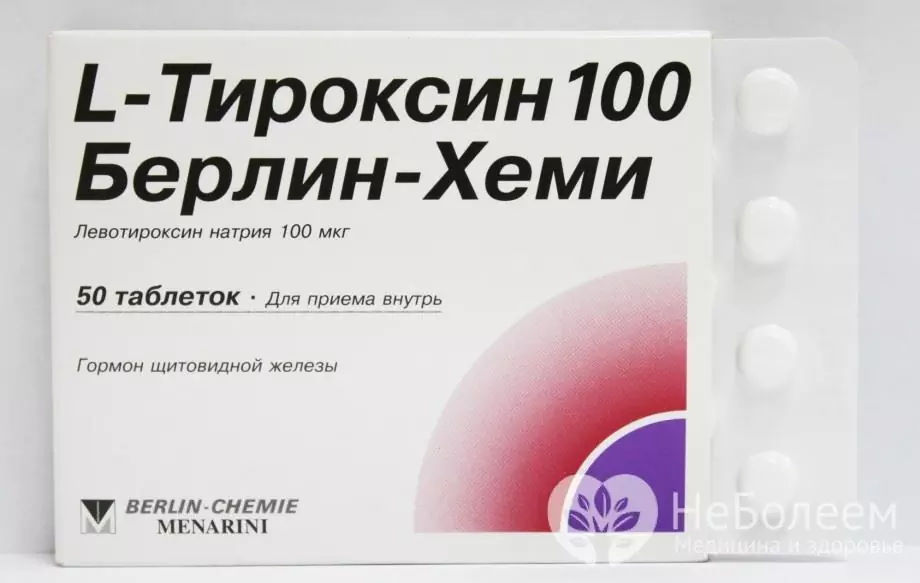- Author Rachel Wainwright [email protected].
- Public 2023-12-15 07:39.
- Last modified 2025-11-02 20:14.
Thyroxine overdose
Thyroxine is the main hormone of the thyroid gland; it accounts for 70-80% of the total mass of hormones produced. It has a weak biological effect, being in fact a prohormone. The activity acquires directly in peripheral tissues, being converted into triiodothyronine (T 3).

Source: ircenter.ru
The amount of the hormone produced is regulated by its concentration in the systemic circulation according to the feedback principle - with an excess of thyroxine in the blood, a signal is sent to the structures of the brain that produce stimulating or inhibiting substances, where the production of the latter is activated. By acting on the thyroid gland, they reduce its activity, reducing the formation of thyroxine. The opposite situation occurs with hormonal deficiency.
Thyroxine has no specific target cells, affecting any cells in the body. It can be classified as a vital substance: T 3 regulates all types of metabolism, accelerating or slowing down metabolism, increases body temperature, increases the sensitivity of body structures to adrenaline and norepinephrine, stimulates the nervous, cardiovascular system and accelerates the synthesis of proteins on ribosomes.
In case of insufficiency of this hormone, its tableted synthetic analogs (Levothyroxine, L-thyroxine) are prescribed, which allow maintaining the functioning of the body at the proper level.
Indications for the use of synthetic hormone analogs:
- decrease in thyroid function, primary or as a result of other diseases;
- obesity;
- cretinism;
- cerebral-pituitary diseases;
- systemic autoimmune diseases involving the thyroid gland;
- condition after surgical treatment of goiter, including as a prevention of relapse;
- diffuse goiter with normal function;
- combined therapy of hyperthyroidism with thyreostatics after normalization of function;
- postoperative treatment of malignant neoplasms of the thyroid gland as replacement therapy.
Thyroxine is often taken without a doctor's prescription - in professional sports in order to speed up metabolism and in everyday life to reduce body weight.
How much thyroxine is needed for an overdose?
The therapeutic dose of tyrokine is determined gradually, depending on the clinical situation. The initial (minimum) dose for an adult is 25 mcg / day. The amount of the drug is increased over several weeks until a maintenance dose is reached, which is calculated individually, depending on the patient's condition, from 125 to 250 μg / day.
The maximum therapeutic dose, above which an overdose clinic may develop, is 300 mcg / day.
Signs of overdose
The availability and widespread use of synthetic thyroid hormone preparations leads to a large number of acute overdoses. This is facilitated by an independent decision to take thyroxine without consulting a specialist and monitoring the level of T 3, T 4 and thyroid-stimulating hormone in the blood.
This practice also leads to chronic overdose, which develops with prolonged intake of thyroxine doses exceeding the therapeutic one, but not high enough for the development of an acute reaction.
The main signs of an acute overdose are:
- palpitations;
- dyspeptic disorders (pain in the stomach, nausea, loss of appetite, diarrhea);
- dry mouth;
- headache;
- tachycardia and increased blood pressure at rest or with a slight load;
- tremor of the limbs;
- insomnia;
- motor and speech excitement, agitation;
- subfebrile temperature.
These symptoms appear, as a rule, several days after the start of administration, which is associated with a low rate of thyroxine conversion in peripheral tissues and the fact that a certain time is required for the activation of intracellular receptors and protein synthesis.
The manifestations of chronic intoxication develop over a long period of time against the background of systematic intake of thyroxine:
- weight loss;
- irritability, tearfulness, emotional lability;
- heat intolerance;
- increased sweating;
- violation of sleep and wakefulness;
- decreased attention and memory, fatigue;
- osteoporosis;
- muscle cramps of the lower extremities;
- dyspnea;
- arterial hypertension;
- increased heart rate;
- in women - menstrual irregularities.

Source: depositphotos.com
First aid for thyroxine overdose
If symptoms occur immediately after taking the drug, you must:
- Perform a gastric lavage, for which drink 1-1.5 liters of water or a slightly pink solution of potassium permanganate and provoke an emetic urge by pressing on the root of the tongue.
- Take enterosorbent (Enterosgel, Polysorb, Polyphepan according to the scheme or activated carbon at the rate of 1 tablet per 10 kg of body weight).
- Take a saline laxative (magnesium sulfate).
If symptoms of an overdose have occurred a few days after the start of taking the drug, you must immediately stop therapy and contact your doctor or call an ambulance (depending on the severity of the condition). It is inappropriate to carry out activities that promote the binding and elimination of excess thyroxine.
Antidote
There is no specific antidote to thyroxine.
When is medical attention required?
It is necessary to seek help in several cases:
- a child, a pregnant woman, an elderly patient was injured;
- there is a sharp tachycardia, arrhythmia;
- blood pressure numbers rose sharply;
- has developed indomitable diarrhea, traces of blood are present in the stool;
- developed neurological symptoms (convulsions, paresis, paralysis);
- the victim is inaccessible to contact or is in a depressed state of consciousness.
Depending on the severity of the condition, the victim receives outpatient treatment or is hospitalized in a specialized department of the hospital, where symptomatic pharmacotherapy is carried out:
- beta-blockers for tachycardia and hypertension;
- glucocorticosteroids to suppress peripheral tyrosine conversion;
- in severe cases - hemosorption, plasmapheresis.
Possible consequences
As the consequences of an overdose of thyroxine, the following are possible:
- the development of allergic reactions, up to Quincke's edema;
- hyperthyroidism;
- inhibition of the production of hypothalamic-pituitary hormones that regulate the function of the thyroid gland;
- bronchospasm;
- angina pectoris;
- osteoporosis.
YouTube video related to the article:

Olesya Smolnyakova Therapy, clinical pharmacology and pharmacotherapy About the author
Education: higher, 2004 (GOU VPO "Kursk State Medical University"), specialty "General Medicine", qualification "Doctor". 2008-2012 - Postgraduate student of the Department of Clinical Pharmacology, KSMU, Candidate of Medical Sciences (2013, specialty "Pharmacology, Clinical Pharmacology"). 2014-2015 - professional retraining, specialty "Management in education", FSBEI HPE "KSU".
The information is generalized and provided for informational purposes only. At the first sign of illness, see your doctor. Self-medication is hazardous to health!






